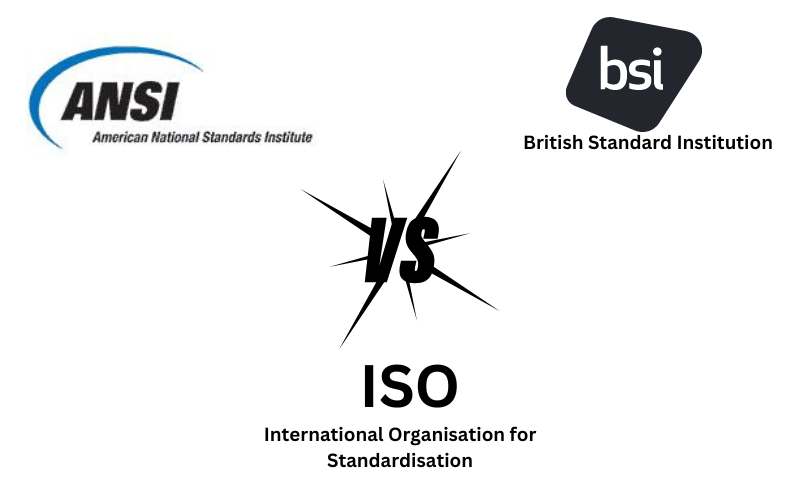Have you ever wondered why your phone charger fits into your phone regardless of the brand, or why different brands of USB drives can all be used on your computer? The answer lies in standards! Organisations such as the American National Standards Institute (ANSI), the British Standards Institution (BSI), and the International Organisation for Standardisation (ISO) play a pivotal role in ensuring the quality, safety, and interoperability of the products and services we use daily. These standard-setting bodies collaborate and contribute to harmonising international specifications, making data exchange and technological advancements smoother and more reliable.
What is ANSI?
The American National Standards Institute (ANSI) is a private, non-profit organisation that plays a key role in overseeing the development of voluntary consensus standards in the United States. Founded in 1918, ANSI’s mission is to enhance both the global competitiveness of U.S. business and the U.S. quality of life by promoting and facilitating voluntary consensus standards and conformity assessment systems, and ensuring their integrity.
Here are the key functions of ANSI:
- Accreditation: ANSI does not develop standards itself. Instead, it accredits standards developing organisations (SDOs) that do. ANSI ensures these organisations adhere to principles of openness, balance, consensus, and due process in their standards development activities. ANSI-approved standards are called “American National Standards”
- Promotion of U.S. Standards Globally: ANSI represents the interests of U.S. stakeholders in global standardization forums, including the International Organization for Standardization (ISO) and the International Electrotechnical Commission (IEC).
- Facilitation of Conformity Assessment: ANSI also accredits organizations that provide product or system certification, testing, and quality assessments, ensuring these services are conducted in a consistent and comparable manner.
- Education and Training: The institute provides education and training programs on standards and their role in business, the economy, and the regulatory environment.
- Advocacy and Public Policy: ANSI represents the needs and views of U.S. stakeholders in trade and policy discussions related to standards, both domestically and internationally.
Overall, ANSI’s activities help ensure the effectiveness of standards in promoting safety, environmental care, and economic vitality, impacting nearly every sector of the U.S. economy.
Please check out the ANSI page for obtaining ANSI Resource.

What is BSI?
BS standards are a collection of standards developed by the BSI (British Standards Institution). The BSI acts as the national standards body for the UK. Here’s a breakdown of BS standards:
- Function: These standards establish guidelines and specifications for a wide range of products, services, and processes. They aim to ensure quality, safety, efficiency, and consistency across various industries.
- Development: The BSI collaborates with industry experts, government bodies, and consumer groups to create these standards. This ensures the standards are practical, relevant, and reflect current best practices.
- Types of BS Standards: There are numerous BS standards covering a vast spectrum. Some common examples include:
- BS EN standards: These are British adoptions of European Standards (EN) published by the European Committee for Standardization (CEN). They ensure compatibility with products across Europe.
- BS ISO standards: These are adoptions of International Organization for Standardization (ISO) standards within the UK context. They promote global trade by aligning British practices with international norms.
- Unique British Standards: The BSI also develops original British Standards specific to UK needs and considerations.
- Impact: BS standards play a vital role in the UK economy by:
- Protecting Consumers: They ensure product safety and quality, giving consumers confidence in their purchases.
- Enhancing Business Efficiency: By following established standards, businesses can streamline production, reduce errors, and improve overall quality control.
- Facilitating Trade: British Standards aligned with international norms ease the process of exporting and importing goods.
- Identifying BS Standards: Look for the “BS” prefix followed by a unique identification number on products or packaging. The BSI website also offers a searchable database to explore various BS standards in detail https://www.bsigroup.com/.
In essence, BS standards serve as a crucial foundation for a safe, efficient, and prosperous marketplace in the UK.

What is ISO?
ISO, or the International Organisation for Standardisation, is an independent, non-governmental international organisation that develops and publishes a wide range of international, industrial, and commercial standards. Founded in 1947, ISO is composed of national standards bodies from over 160 countries, with a central secretariat in Geneva, Switzerland, that coordinates the system.
Here are the key aspects of ISO:
- Global Standards Development: ISO facilitates the creation of universal standards to ensure quality, safety, efficiency, and interchangeability of products and services across different industries worldwide. Its standards cover almost all aspects of technology and manufacturing.
- Membership and Participation: Each member country is represented through a national standards body, and only one member from each country is allowed. These members participate in the standardisation process and can have influence proportional to the organisations operating rules. Members meet annually at the General Assembly to discuss ISO’s strategic objectives.
- Consensus Process: ISO standards are developed through a consensus-based approach, which involves experts from various global industries and organisations. These experts negotiate all aspects of the standard, including its scope, key definitions, and content.
- Wide Range of Standards: ISO has published over 23,000 standards covering diverse areas, including but not limited to, technology, food safety, agriculture, and healthcare. Some well-known ISO standards include ISO 9001 (quality management systems), ISO 14001 (environmental management systems), and ISO/IEC 27001 (information security management).
- Promotion of International Trade: By standardising protocols across different markets and industries, ISO standards facilitate international trade by ensuring that products and services are safe, reliable, and of good quality.
ISO plays a crucial role in shaping how businesses and governments collaborate. The ISO website provides further details https://www.iso.org/home.html.

Difference Between ANSI, BS and ISO.
- Scope and Geographic Influence:
- ANSI: ANSI (American National Standards Institute) is a private, non-profit organization based in the United States. It oversees the development of voluntary consensus standards primarily for the U.S. market but also participates in international standardization activities.
- BS (British Standards): BS refers to the national standards of the United Kingdom, established and maintained by BSI Group (British Standards Institution). While primarily serving the UK market, British Standards often influence international standards and are recognized globally.
- ISO (International Organization for Standardization): ISO is an international organization that develops and publishes standards with a global scope. It comprises national standards bodies from over 160 countries and creates standards that are adopted internationally, including by ANSI and BSI.
2. Standard Development Process:
- ANSI: ANSI accredits standards developing organizations (SDOs) and facilitates the development of voluntary consensus standards through a consensus-based process involving stakeholders from various sectors.
- BS: British Standards are developed by committees of experts representing industry sectors, consumer groups, and academia. These committees work under the auspices of BSI Group to draft, revise, and update standards.
- ISO: ISO standards are developed through a consensus-based approach involving experts from around the world. ISO coordinates the efforts of national standards bodies to develop standards that meet global market needs and promote interoperability.
3. Coverage and Application:
- ANSI: ANSI standards cover a wide range of sectors and industries, including technology, construction, health and safety, and information technology, among others.
- BS: British Standards address various areas such as building and construction, electrical engineering, healthcare, and information technology, among others.
- ISO: ISO standards encompass almost all aspects of technology and manufacturing, including quality management, environmental management, information security, and food safety, among others.
4. Legal and Commercial Impact:
- ANSI: Compliance with ANSI standards may be voluntary or mandated by regulatory bodies or contractual agreements within the United States.
- BS: Compliance with British Standards can be required by UK legislation, contractual agreements, or industry regulations, impacting businesses operating in the UK and those exporting to the UK.
- ISO: ISO standards are voluntary unless adopted into law by national or regional regulatory bodies. Compliance with ISO standards can demonstrate conformity to best practices and regulatory requirements, enhancing market access and competitiveness globally.
5. Legal and Commercial Impact:
- ANSI: ANSI participates in international standardization efforts and represents U.S. interests in global standardization forums such as ISO and IEC (International Electrotechnical Commission).
- BS: British Standards often serve as a basis for international standards and are recognized globally, contributing to harmonization efforts and facilitating international trade and cooperation.
- ISO: ISO standards are developed to meet global market needs and are adopted by countries worldwide, promoting interoperability, safety, and quality on an international scale.
In summary, while ANSI, BS, and ISO all play crucial roles in standardization, each organization has its own focus, geographic influence, and standardization processes tailored to meet the needs of their respective stakeholders and markets.
Why Are ANSI, BS and ISO Important?
ANSI, BS, and ISO all play vital roles in ensuring a safe, efficient, and globally connected marketplace. Here’s a breakdown of their importance for consumers, businesses, and governments:
For Consumers:
- Enhanced Safety and Quality: Standards established by these organizations minimize risks associated with products and services. For instance, BS EN 71 ensures toy safety in the UK, similar to how ANSI/UL standards safeguard electrical appliances in the US. ISO standards like ISO 22000 (Food Safety Management) promote food safety practices across the globe.
- Consistent Functionality and Labeling: Standards promote consistent design and functionality across different brands. Imagine the frustration of a mismatched power plug! Standardized labeling also simplifies product understanding for consumers.
- Increased Confidence: By adhering to recognized standards, manufacturers demonstrate their commitment to quality and safety. This fosters consumer trust in the products they purchase.
For Businesses:
- Streamlined Production and Trade: Standards facilitate compatibility between products made by different companies. This eliminates the need for multiple versions for various markets, reducing production costs. Businesses can design products with confidence, knowing they’ll be compatible with existing infrastructure and standards. ISO standards like ISO 9001 (Quality Management) promote efficient production processes for businesses of all sizes.
- Improved Efficiency and Quality Control: Standardization allows companies to streamline operations, minimize errors, and implement robust quality control measures. This leads to cost savings, increased efficiency, and a competitive edge in the global marketplace.
- Demonstrated Best Practices: Compliance with recognized standards like ISO 14001 (Environmental Management) showcases a company’s commitment to environmental responsibility, potentially attracting environmentally conscious consumers and investors.
For Governments:
- Effective Regulations: Governments can leverage established standards to set clear and consistent regulations across different industries. This simplifies the regulatory process for businesses and ensures a minimum level of safety and quality for products and services.
- Public Health and Safety: Standards can address public health and safety concerns. Building regulations often reference specific BS EN standards in the UK, ensuring safe construction practices. Similarly, ISO standards can promote food safety practices within a country.
- Facilitated Trade: Globally recognized standards like those from ISO ease international trade by ensuring product compatibility and adherence to safety regulations across borders.
In conclusion, ANSI, BS, and ISO contribute significantly to a well-functioning global economy. They empower consumers with safer products, aid businesses in streamlining operations and expanding their reach, and assist governments in setting effective regulations. These standards ultimately promote safety, quality, efficiency, and interoperability on a global scale.





